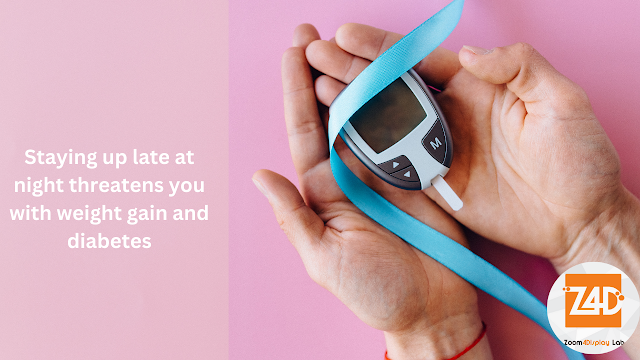Staying up late at night threatens you with weight gain and diabetes
A recent study found that people who stay up and spend more time at night may be more likely to develop type 2 diabetes and heart disease, compared to early sleepers.
The study was conducted by researchers from Rutgers University, New Jersey, USA, and was published in the Journal of Experimental Physiology, and carried by the Physiological Society website.
The researchers found that "wake-sleep" cycles cause differences in metabolism and alter the body's preference for energy sources.
Fat use
The study found that those who stayed up late had a reduced ability to use fat for energy, which means that fat may build up in the body and increase the risk of type 2 diabetes and cardiovascular disease.
The metabolic differences were related to how well each group was able to use insulin to enhance cells' uptake of glucose for storage and energy use.
People who prefer to be active in the morning rely more on fat for energy and are more active during the day with higher levels of aerobic fitness than people who stay up at night.
On the other hand, people who prefer to be active later in the day and night use less fat for energy while resting and exercising.
Differences in metabolism
Lead author of the study, Professor Stephen Malin of Rutgers University, said: 'Differences in lipid metabolism between 'early birds' - those who are active in the morning - and 'night owls' - who are active at night - show that our circadian rhythms ( The wake/sleep cycle) can affect how our bodies use insulin.
The researcher added, "A sensitive or impaired ability to respond to the hormone insulin has major implications for our health. This observation advances our understanding of how our body's circadian rhythms affect our health. Since chronological pattern appears to influence metabolism and the functioning of our hormones, we suggest that temporal pattern can be used as a predictor of an individual's disease risk."
Diabetes and sleep
According to a report by Michael Bruce, published by "Psychology Today" in 2018, there are data indicating the relationship of sleep quality to a possible increased risk of diabetes, due to the presence of several overlapping factors that directly cause disruption in the functions of some internal organs of the body.
The author stated that sleep is the period of time that the body uses to restore and repair cells. This process includes the maintenance of the immune system and metabolic functions.
In general, sleep disturbances affect diabetes directly and indirectly, by causing changes in hormones, which contribute to weight gain and obesity. As a result, both the behavior and lifestyle of sufferers change. On the other hand, good quality sleep increases the body's ability to regulate hormones and insulin to regulate blood sugar.
Moreover, not getting adequate amounts of sleep at a rate of 8 hours per day is not the only factor that increases the risk of developing diabetes, it is important to take into account the quality and patterns of sleep, as well as the habits we follow. Scientific research has revealed that poor sleep can affect the metabolism, causing an increased risk of developing this disease. On the other hand, there is scientific evidence linking sleeping for long hours and an increased risk of developing this disease.
Michael Bruce pointed out that among the discoveries made by scientists during their study of the relationship between sleep and diabetes is that bad or "unhealthy" sleep affects the body's production of insulin and the way it is used. On the other hand, "unhealthy" sleep leads to cravings for foods rich in fat and high in sugar.
Shipping you a FREE Keto cookbook home door link in bio. https://bio.link/zoom4diet
don't hesitate to check my bio link for the best weight loss and diet best-selling products in the network from the side menu of this page, and please share this article on your social media if you enjoy it.

.png)
.png)
.png)
.png)